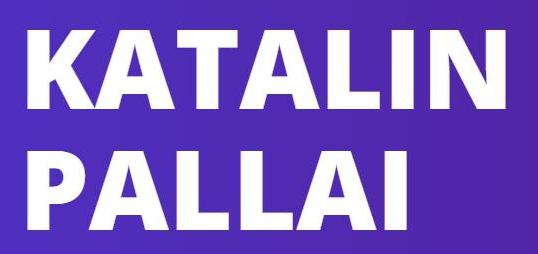3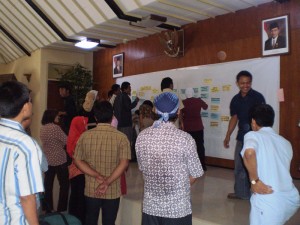 I have spent 20+ years working with local government and civil society stakeholders in numerous countries and cultures including Hungarian, Eastern- and South-East European, Asian, and currently I live in Austria. I developed expertise in working with local governments and various other stakeholders on specific local issues, like public participation, local service provision and conflict resolution in highly diverse and multi-ethnic communities. My first hand experience, underpinned with academic studies, gives the in depth understanding of the difference in cultural attitudes and codes, and the challenges of working across cultures.
I have spent 20+ years working with local government and civil society stakeholders in numerous countries and cultures including Hungarian, Eastern- and South-East European, Asian, and currently I live in Austria. I developed expertise in working with local governments and various other stakeholders on specific local issues, like public participation, local service provision and conflict resolution in highly diverse and multi-ethnic communities. My first hand experience, underpinned with academic studies, gives the in depth understanding of the difference in cultural attitudes and codes, and the challenges of working across cultures.
Tailor-made Inter-cultural/inter-ethnic communication, cooperation and conflict resolution trainings
On demand I can design courses tailored to the specific needs of groups and expectations of clients. In training design and delivery I have a long experience that is detailed below.
I have designed many courses whose aim was to enhance participants’ intercultural awareness, and strengthen their skills and competence to work effectively with partners from other cultures. During the courses through different exercises (like, story telling, discussions, role plays, and individual and group reflections) participants understand how cultural values and attitudes affect intercultural/inter-ethnic communication and interaction. They also learn key concepts related to identity formation and to the political and policy options for accommodating the needs and aspirations of diverse identity groups. From case studies they see models and strategies for more effective intercultural communication, for improved working across cultures, and for resolving intercultural misunderstandings and conflicts. The result can be better understanding of clients, awareness and appreciation of cultural difference and reduced conflict in the community.
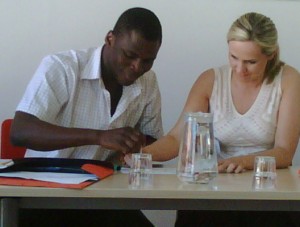 By my experience such courses work best when participants are as diverse, as the communities they live in. They can help in preparatory phases of conflict resolution processes as well. Facilitated work in the safe environment of the training can help minorities and immigrants to understand the relationship between their own culture and the dominant culture, and majority members to understand the specific challenges of their own and their counterparts’ in developing constructive and fulfilling relations. In such environments while participants develop their personal intercultural competence, they can also develop relations and ideas that can contribute to developing the intercultural competence of the organization, to enhance the level of services provided and decrease frustration and conflict among stakeholders.
By my experience such courses work best when participants are as diverse, as the communities they live in. They can help in preparatory phases of conflict resolution processes as well. Facilitated work in the safe environment of the training can help minorities and immigrants to understand the relationship between their own culture and the dominant culture, and majority members to understand the specific challenges of their own and their counterparts’ in developing constructive and fulfilling relations. In such environments while participants develop their personal intercultural competence, they can also develop relations and ideas that can contribute to developing the intercultural competence of the organization, to enhance the level of services provided and decrease frustration and conflict among stakeholders.
My previous experience in intercultural management
Although much more of my previous activities belong to intercultural management I list on this page only those projects whose name contain the intercultural or interethnic word. On other pages of my site there are many other intercultural accomplishments, as it is an intercultural challenge:
- to design and lead negotiation, planning or conflict resolution processes when concerns, views and ideas of experts of different fields and very different stakeholders need to be integrated in synergic agreements.
- to contribute to the creation of shared norms and rules in the process of integrity management. To assist stakeholders and organizations to adjust practices to the ideal of democratic public integrity.
These other intercultural projects are on other pages.
Leading collaborative process of complex curriculum and faculty development, since 2014
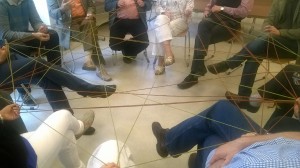 This project is presented in more details on the Public Integrity page of this site. I had to develope a curriculum for teaching integrity advisers, the first professionals in a newly created profession. The curriculum development process is included here because I involved three groups of professionals in the curriculum development process: academics, anti-corruption practitioners and professionals from the fields of organizational development and dialogic processes. The challenge was to establish a constructive inter-professional dialogue. I led the faculty through a series of faculty workshops where substantive collaboration evolved among faculty members coming from different professional paradigms. The results was that key elements of a consistent language and comnceptual underpinnings could be agreed for the program and consistent curriculum developed. Pallai paper WCCI integrity pedagogy
This project is presented in more details on the Public Integrity page of this site. I had to develope a curriculum for teaching integrity advisers, the first professionals in a newly created profession. The curriculum development process is included here because I involved three groups of professionals in the curriculum development process: academics, anti-corruption practitioners and professionals from the fields of organizational development and dialogic processes. The challenge was to establish a constructive inter-professional dialogue. I led the faculty through a series of faculty workshops where substantive collaboration evolved among faculty members coming from different professional paradigms. The results was that key elements of a consistent language and comnceptual underpinnings could be agreed for the program and consistent curriculum developed. Pallai paper WCCI integrity pedagogy
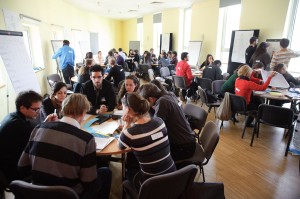 Multiculturalism academic course in training format, since 2013
Multiculturalism academic course in training format, since 2013
The course is part of the Masters in International Public Management curriculum at the Hungarian National University of Public Service, I developed it both in English and Hungarian. Its aim is to develop students’ intercultural competencies, with focus on knowledge, skills and behaviors necessary to deal with clients and partners of public service. The knowledge components enhance students’ capacity to map and understand different assumptions, values and mind sets of clients, and introduce students to key conceptual frameworks of multiculturalism and to the principles of collaborative negotiation and non-violent communication. The skill and behavioral components offer opportunity to collect personal experiences and practice problem solving and conflict resolution methods in simulated multicultural and multi-ethnic situations. The course is held in a training format that is based on experimental teaching methodology. The students participate in interactive exercises, individual and group reflections and debates. They experience multicultural situations and learn problem solving and conflict resolution techniques. The teacher acts as facilitator during the exercises, and after the exercise debriefing, builds short conceptual presentations on the conclusions reached by the group.
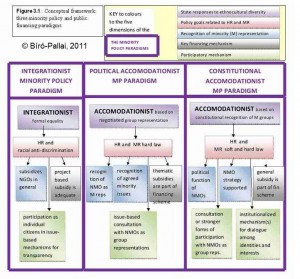 Analysis of the distribution of public financial support (subsidies) for national minority associations, 2010-11
Analysis of the distribution of public financial support (subsidies) for national minority associations, 2010-11
Research and analysis of survey data prepared for the Committee of Experts on Issues Relating to the Protection of National Minorities of the Council of Europe with Annamária Bíró. The analysis was executed on the basis of a questionnaire filled up by 22 countries. On the basis of the information presented by the countries it analyzed actual financing schemes and the underlying approaches. The paper also developed an interdisciplinary conceptual framework for the analysis of the impacts that a given financial arrangement can exercise to the self representation and identity preservation/building of the national minorities.
Mentoring Municipalities in Roma Education, 2010
The Roma Education Fund supported the DILS project whose goal is to support local governments and stakeholders in developing and implementing an integrated enrollment policy and system support for the successful education of Roma children – from the preparatory pre-school education onwards – incorporated in the Local Action Plans for Roma education. One component of the program was to train Mentors to work with local governments and support the elaboration and implementation of integration strategies and policies. My role was to supervise the design and elaboration of the materials for the training of the mentors, and to train the Serbian speaking trainers who were commissioned with the training of mentors.
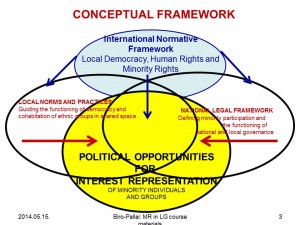 Minority rights and local governance, training courses, 2009-11
Minority rights and local governance, training courses, 2009-11
I developed and presented with Annamária Bíró different courses on the topic for widely international audiences. Our focus was on local political opportunities (and limitations) in the accommodation of the needs and aspirations of ethno cultural minorities with a special interest in the normative dimension. The courses centered on ‘public participation’, since this is regarded as a foundational minority right, that is a right that is essential for the realization of other minority rights. During the courses we discussed with participants existing local multicultural policies and practices in order to identify the major issues and dilemmas in the local management of ethnocultural diversity. In order to understand these issues and dilemmas, various (often overlapping) aspects of the local political opportunities were analyzed that can enable or block the local accommodation of ethno cultural diversity. For the analysis we introduced the distinction between issue based participation and participatory institution building, and for the deeper analysis of longer term processes we discussed the relation between participatory institution building and the process of international and local norm formation process.
Public participation in multi-ethnic local governments, 2009-11
In jurisdictions where different ethnic groups share a place where they live, and the conceptualization of some local affairs is differentiated along ethnic lines, participation of stakeholders in the policy process is essential to building sustainable and just local societies. The manual discusses how public participation can be designed and managed in multi-ethnic contexts in a manner that it can support the implementation of the policy goals set by the local political community. The manual presents the key terms and concepts and the most important body of practical knowledge on local public participation, and examines the specific consequences of the multi-ethnic environment on the design and implementation of participatory mechanisms.
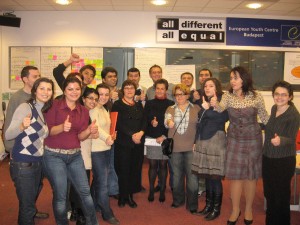 Multi-ethnic Community Management Program, 2005-11
Multi-ethnic Community Management Program, 2005-11
Between 2005 and 2011 I worked for 7 years as faculty in the frame of this program established by the Open Society Institute and had the opportunity to develop and teach courses with leading experts of minority rights and other fields of minority studies. The courses focused on local political opportunities (and limitations) in the accommodation of the needs and aspirations of ethno cultural minorities. The course development was an interdisciplinary work where my role was to bring in the knowledge of local governance, dispute resolution and field experience from local democracy building. During the course development I worked with the minority experts to develop an integrated conceptual framework and experience based teaching material to discuss existing local multicultural policies and practices and to identify the major issues and dilemmas in the local management of ethnocultural diversity. Each course was presented to a widely international audience, including participants from Europe, Africa, Asia. The courses I designed and led with a co-trainer were: Minority rights and local governance; Power sharing in Multi-ethnic Communities; Public Policy Process in Multi-ethnic Communities; Service delivery in Multi-ethnic Communities; Managing Conflict and Urban Development in Multi-ethnic Communities.
